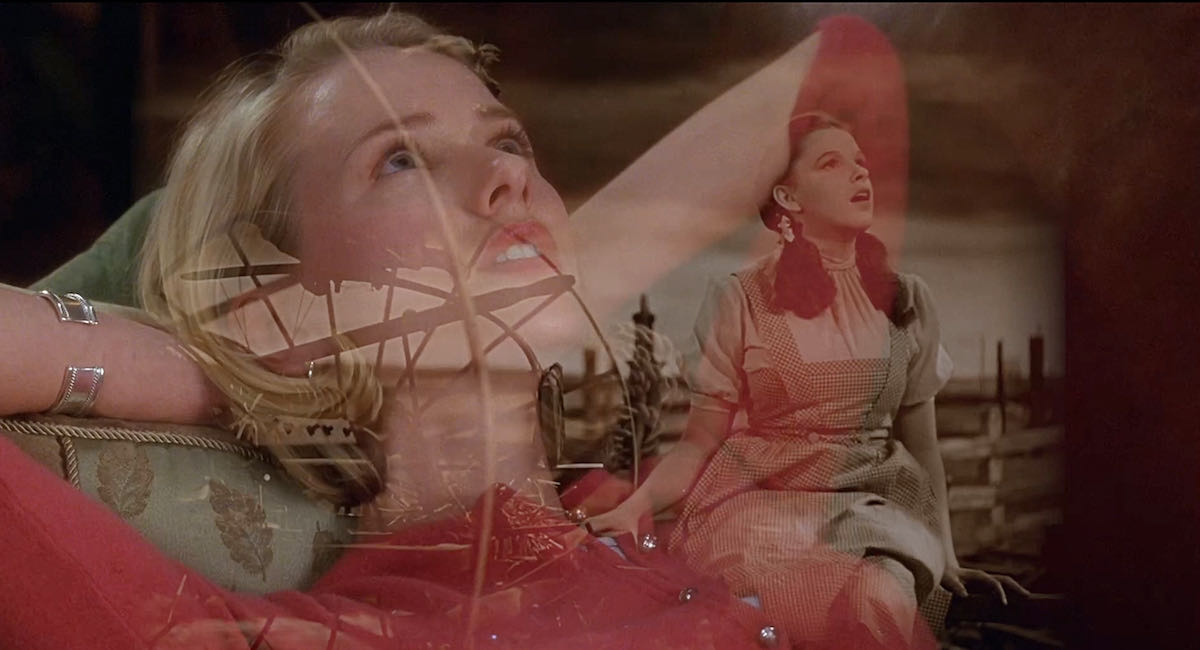I first encountered David Lynch's work in 1977. It was at a midnight show of Eraserhead, his first film. No one had heard of him. The theater was pretty empty. I had gone there alone. I sat there in the dark, not sure what the hell I was watching. It seemed so crazy yet so familiar. At about 2:30 a.m., the movie ended to stunned silence. The credits rolled, and one guy, in the middle of the auditorium, actually stood up and implored the screen, "What kind of mind comes up with something like this??"
What kind of mind indeed?
That night was one of my most memorable times in the cinema—the film and the guy—and I say that not to impress you that I saw him that early, but to say how satisfying it's been to watch David Lynch's career trajectory since. Lynch has been called a lot of things; in the new film Lynch/Oz, a "populist surrealist." I'm a fan. He is, in my opinion, a poet of my generation: the generation that was raised on black and white TV, rabbit ears, three networks, and signoff at midnight to the tune of the Star-Spangled Banner. That experience shapes a person. It shaped David Lynch.
In Lynch/Oz, director Alexandre O. Philippe attempts to define that shape by way of The Wizard of Oz. That film is eighty years old, and was released in the same year, and made by the same director (Victor Fleming) as Gone with the Wind. It found popularity not in 1939 but later, on TV, on those snowy black and white screens. For many of us, it was our introduction to Dorothy, Toto, and crew. TV was the only way to see it, pre-VHS, and it was formative. Lynch's generation was raised on wonder, and realizing that Wizard wasn't originally snowy, or solely in black and white but was in fact in glorious sepia and Technicolor was a head spinner. It opened new layers to our shared aesthetic.

You might say "yeah, yeah," linking Lynch and Oz is a little facile and even redundant, given all the explicit allusions to it in films like Wild at Heart and Mulholland Drive. Of course, we see it in Blue Velvet, Lost Highway, The Elephant Man, and even in the Disney-fied The Straight Story. One could make the case that Twin Peaks, the series and Fire Walk with Me, is a virtual remake of The Wizard of Oz, and it may not be completed yet. Lynch/Oz even challenges Joseph Campbell's seminal Hero's Journey, demonstrating how The Wizard of Oz represents nothing less than a sturdy template for the tales in the "grand scope of American storytelling," in all their triumphs and disappointments.
Mr. Philippe is intent on showing us the story inside of the story. Lynch/Oz rolls out slowly and lovingly and ends up a real feast for the cinephile. It's divided into six chapters—Wind, Membranes, Kindred, Multitudes, Judy, and Dig—and leaves it to reliable narrators such as Amy Nicholson, John Waters, Karyn Kusama, and David Lowrey to make intriguing connections and discuss recurring themes and techniques: parallel worlds, multiple identities, opacity transitioning, frame performances, even Judy Garland's life—all are viewed as instrumental in portraying the American character's "attitude toward adventure, which will be unplanned, a surprise."
So many connections, so much to ponder (including why in the hell Naomi Watts didn't win an Oscar for her performance in Mulholland Drive). Phillippe's artful split screen compares Lynchian scenes to those in non-Lynch movies like The Matrix, Back to the Future, The Big Lebowski, Apocalypse Now(!), even I Wake Up Screaming, inspiring epiphanies and Eureka moments. Especially affecting is the sweet montage of auteurs and their favorite flourishes: Hitchcock's birds, Malick's fields, Campion's curtains, Wong Kar-Wei's mirrors. Clips evidence how these motifs appear often enough, integrally enough, in each filmmaker's work, that it becomes style. All to help us understand the strange power Lynch exercises.
I could go on, but I don't want to spoil the joys of discovery. Here's a perfect double feature: Lynch/Oz on the same bill as Thom Andersen's 2003 video essay Los Angeles Plays Itself. Both will remind you of some of the reasons you love movies in the first place. Both contemplate the art and the artifice that holds films together.
Mr. Philippe directs movies about movie directors, like 78/52: Hitchcock's Shower Scene (2017), Leap of Faith: William Friedkin on the Exorcist (2019). Mr. Lynch himself did not participate in the making of Lynch/Oz. He hovers over it, though, in excerpts from interviews, speeches, and his YouTube weather reports. Lynch is as always affable yet driven. He is an enigma, given to grotesque visions yet a practitioner of transcendental meditation. Such singular appetites. To John Waters he's said, "I love making the movie. Then it's released and the heartbreak begins." His homespun brand of passion is delivered in that midwestern twang. He laments early compromises: "When you don't have final cut, total creative freedom, you stand to die the death. And die I did."
The point is not to figure out David Lynch, to solve him. Better to bask in the mystery, savor the complexity. One exasperated interviewer says to him onstage, after having advanced a particularly cogent theory: "I know you hate saying what things mean in your films. But am I right in thinking that that's at least (audience titters) in the right area?"
David Lynch smiles and waits a beat.
"No," he answers.
________________________________________________
Lynch/Oz. Directed by Alexandre O. Philippe. Produced by Janus Films and Exhibit A Pictures. 108 minutes. 2022. In theaters.
